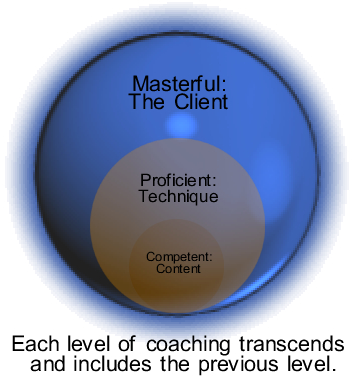 Last night's call with Adela Rubio* was awesome, but it brought up a controversy in coaching which is, what is coaching, anyway?
Last night's call with Adela Rubio* was awesome, but it brought up a controversy in coaching which is, what is coaching, anyway?
You'd think by now we'd have that figured out, wouldn't you? Well we have. The thing is, in a profession with no unifying body, we naturally have more than one definition.
That's what makes coaching controversial. People know it 'works', because we have research and results, but not everybody agrees on what coaching is to begin with.
I'm sympathetic to a point, with the folks who say anything goes, since we're not regulated. But ultimately that point of view is a disservice to the consumer, who trust me, is way more confused than we are.
I believe coach trainers and certifiers owe it to the public to speak up about standards in coaching. This isn't every coach's job, but it's our job, because of the positions we're in.
So here's my stand on what is coaching:
'Pure' coaching is a highly customized conversation between a professional and a client that leads to a successful outcome for the client. In it's purest form, coaching is delivered one-to-one. Small group delivery also makes customization possible and has other advantages.
It's certainly possible to share coaching questions, excercises and come-froms in larger groups or via information products. They may be highly effective and more cost-efficient. But nothing beats the customization of pure coaching.
There. I said it!
Does this mean I'm against internet marketing or coaching products? Of course not! I use both. But if you're a coach with multiple product streams, please at least be a competent coach.
That's the issue that actually interests me:
What is a masterful vs proficient vs competent coach?
They each are important, because they each reflect a mindset. A new coach coaches differently from the very beginning if they commit to mastery vs competency. Mastery is a commitment to always learning, to always be upgrading the service and results that we deliver, to delivering what works, not just what we think people will buy.
In my experience, the coach who focuses on competence is mainly interested in the content of the conversation (or product). I don't think that's enough, because clients can get great content for free.
When a coach goes for proficiency, they get more concerned with the delivery or performance of the coaching. That streamlines the coaching, leading to greater outcomes. And it focuses on 'pure' coaching, as opposed to other delivery methods.
Mastery is a huge level beyond proficiency, because it can only be reached after many hours of practice, to the point that both the content and delivery are so second nature to the coach that all the coach has to focus on is the client. That level of coaching leads to results that are (almost) miraculous.
I've been told by veteran coaches that what we teach at School of Coaching Mastery should be called something else besides coaching, because most coaches don't work at this level. Other veterans say anything less shouldn't be called coaching, at all.
I choose to call what we teach here, 'mastery', because we're committed to always learning, growing, and upgrading the outcomes for our clients. That's the instructors' commitment, not just the students'. It's a journey that we take together and the coaching that we learn to do transcends, but includes the other two levels.
Whether other delivery levels or methods should be called 'coaching', I don't really care. I don't control the whole coaching industry, I just lead one small and very passionate coaching contingent.
What do you think?

If you missed the call with Adela, you can listen for a short time. Join here.
 Recently I interviewed Mattison Grey, MCC, about her 15 years as a super-successful coach and the three secrets to success that she wished she knew when she first became a business coach.
Recently I interviewed Mattison Grey, MCC, about her 15 years as a super-successful coach and the three secrets to success that she wished she knew when she first became a business coach.






